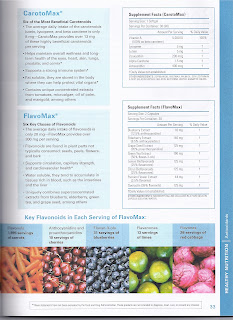Shaklee is known nationwide for its ultra-pure, totally controlled, and carefully made to exacting standards that other nutrition companies cannot and do not perform.
Remember, that any product that Shaklee provides is totally refundable with return of the empty bottle. For more information, My ID is 70324 at www.ljennings.shaklee.com
The anti-inflammatory effects of omega-3 fatty acids have come into focus with a new study published in the Proceedings of the National Academy of Sciences. These effects are believed to be the basis of omega-3s’ wide-ranging health benefits. While omega-3 fatty acids are necessary for human health, the body cannot make them and must get them through food or supplementation.
The University of Maryland Medical Center says: "Research shows that omega-3 fatty acids reduce inflammation and may help lower the risk of chronic diseases such as heart disease and arthritis. Omega-3 fatty acids are highly concentrated in the brain and appear to be important for cognitive (brain memory and performance) and behavioral function. In fact, infants who do not get enough omega-3 fatty acids from their mothers during pregnancy are at risk for developing vision and nerve problems. Symptoms of omega-3 fatty acid deficiency include fatigue, poor memory, dry skin, heart problems, mood swings or depression and poor circulation."
Now scientists at the University of California, San Diego believe they have figured out why omega-3 fatty acids are so healthy. They discovered that omega-3s inhibit the cyclooxygenase (COX) enzyme. This enzyme is important because it can spark inflammation. There are more than 100 inflammatory diseases including Alzheimer’s disease, arthritis, asthma, atherosclerosis, and Parkinson’s disease.
See the report below to learn more about omega-3 fatty acids and how they appear to combat inflammation.
The process behind the widely reported health benefits of omega-3 fatty acids have been revealed for the first time by a team of U.S. researchers.
The scientists mapped the cellular processes that power the health effects of omega-3 fatty acids by studying living mouse cells—finding that the beneficial fatty acids block an enzyme known as cyclooxygenase (COX), which produces the prostoglandin hormones that spark inflammation.
Writing in the Proceedings of the National Academy of Sciences, Professor Edward Dennis and his colleagues from the University of California, San Diego, said their findings also suggest it could be possible to boost the effects of omega-3s and "short-circuit" inflammation before it begins.
"There have been tons of epidemiological studies linking health benefits of omega-3 oils, but not a lot of deep science," Dennis said. "This is the first comprehensive study of what fish oils actually do inside a cell."
The research leader said this ability to unravel what is happening inside cells when treated with omega-3s is "ground-breaking."
"We've been able to look inside a cell, see what fish oils do and determine that the process of inflammation at this level may be manipulatable," said Dennis. "Now we need to learn if we can fine-tune that process so we can use omega-3 oils to reduce the production of pro-inflammatory prostoglandins and boost the production of anti-inflammatory resolvins."
Dennis and his colleagues fed mouse macrophage cells (part of the immune system) three different kinds of fatty acids: eicosapentaenoic acid (EPA), docosahexaenoic acid (DHA) and arachidonic acid (AA).
After supplementation the scientists stimulated them to produce an inflammatory response, finding that the omega-3 fatty acids inhibited the COX enzyme, which produces the prostoglandin hormones that spark inflammation. Dennis noted that this action is similar to what happens when a person takes an aspirin, which disrupts the COX-2 signaling pathway, thus reducing inflammation and pain.
"Using a targeted lipidomics approach, we obsered that toll-like receptor 4 and purinergic receptor activation of supplemented cells leads to the release of 22-carbon fatty acids that potently inhibit cyclooxygenase pathways," the researchers explained.
They added that 22-carbon fatty acid (docosapentaenoic acid—DPA) was responsible for cyclooxengenase inhibition after EPA supplementation, "offering fresh insights into how EPA exerts anti-inflammatory effects indirectly through elongation to 22-carbon DPA."
Proceedings of the National Academy of Sciences; Published online ahead of print.
Body & Earth Healing


